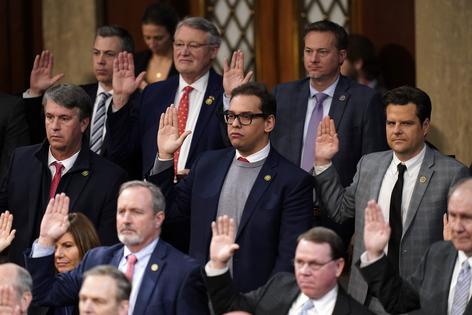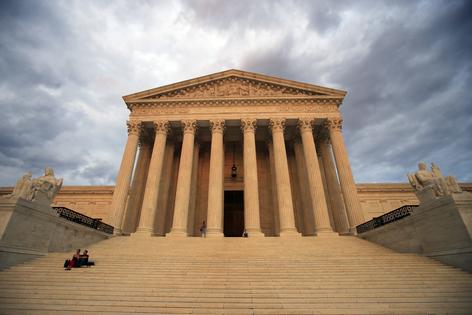George Santos: A democracy can't easily penalize lies by politicians
Published in Political News
George Santos is not the first politician to have lied, but the fables he told to get elected to Congress may be in a class by themselves. Historian Sean Wilentz remarked that while embellishments happen, Santos’ lies are different – “there is no example like it” in American history, Wilentz told Vox in a late-January, 2023, story.
Columnist Peggy Noonan wrote that Santos was “a stone cold liar who effectively committed election fraud.”
And now Santos has taken the dramatic step of removing himself temporarily from the committees he’s been assigned to: the House Small Business Committee and the Science, Space and Technology Committee. The Washington Post reports Santos told his GOP colleagues that he would be a “distraction” until cleared in several probes of his lies.
While Santos’ lies got some attention from local media, they did not become widely known until The New York Times published an exposé after his election.
Santos’ lies may have gotten him into hot water with the voters who put him in the House, and a few of his colleagues, including the New York GOP, want him to resign. CBS News reported that federal investigators are looking at Santos’ finances and financial disclosures.
But the bulk of Santos’ misrepresentations may be protected by the First Amendment. The U.S. Supreme Court has concluded that lies enjoy First Amendment protection – not because of their value, but because the government cannot be trusted with the power to regulate lies.
In other words, lies are protected by the First Amendment to safeguard democracy.
So how can unwitting voters be protected from sending a fraud to Congress?
Any attempt to craft a law aimed at the lies in politics will run into practical enforcement problems. And attempts to regulate such lies could collide with a 2012 Supreme Court case United States v. Alvarez.
Xavier Alvarez was a fabulist and a member of a public water board who lied about having received the Congressional Medal of Honor in a public meeting. He was charged in 2007 with violating the Stolen Valor Act, which made it a federal crime to lie about having received a military medal.
The Supreme Court rejected the government’s argument that lies should not be protected by the First Amendment. The court concluded that lies are protected by the First Amendment unless there is a legally recognized harm, such as defamation or fraud, associated with the lie. So the Stolen Valor Act was struck down as an unconstitutional restriction on speech. The court pointed out that some false statements are “inevitable if there is to be open and vigorous expression of views in public and private conversation.”
Crucially, the court feared that the power to criminalize lies could damage American democracy. The court reasoned that unless the First Amendment limits the power of the government to criminalize lies, the government could establish an “endless list of subjects about which false statements are punishable.”
Justice Anthony Kennedy, who wrote the majority opinion in Alvarez, illustrated this danger by citing George Orwell’s dystopian novel “1984,” in which a totalitarian government relied on a Ministry of Truth to criminalize dissent. Our constitutional tradition, he wrote, “stands against the idea that we need” a Ministry of Truth.
George Santos, unlike Xavier Alvarez, lied during an election campaign.
In Alvarez, the Supreme Court expressed concern about laws criminalizing lies in politics. It warned that the Stolen Valor Act applied to “political contexts, where although such lies are more likely to cause harm,” the risk that prosecutors would bring charges for ideological reasons was also high.
The court believed that the marketplace of ideas was a more effective and less dangerous mechanism for policing lies, particularly in politics. Politicians and journalists have the incentives and the resources to examine the records of candidates such as Santos to uncover and expose falsehoods.
The story of George Santos, though, is a cautionary tale for those who hold an idealized view of how the marketplace of ideas operates in contemporary American politics.
Democracy has not had a long run when measured against the course of human history. From the founding of the American republic in the late 18th century until the advent of the modern era, there was a rough division of labor. Citizens selected leaders, and experts played a critical gatekeeping role, mediating the flow of information.
New information technologies have largely displaced the role of experts. Everyone now claims to be an expert who can decide for themselves whether COVID-19 vaccines are effective or who really won the 2020 presidential election. These technologies have also destroyed the economic model that once sustained local newspapers.
Thus, although one local newspaper did report on Santos’ misrepresentations, his election is evidence that the loss of news reporting jobs has damaged America’s democracy.
The election of George Santos illustrates the challenges facing American democracy. The First Amendment was written in an era when government censorship was the principal danger to self-government. Today, politicians and ordinary citizens can harness new information technologies to spread misinformation and deepen polarization. A weakened news media will fail to police those assertions, or a partisan news media will amplify them.
As a scholar of constitutional law, comparative constitutionalism, democracy and authoritarianism, I believe that Justice Kennedy’s Alvarez opinion relied on a flawed understanding of the dangers facing democracy. He maintained that government regulation of speech is a greater threat to democracy than are lies. Laws that targeted lies would have to survive the most exacting scrutiny – which is nearly always fatal to government regulation of speech.
Justice Stephen Breyer’s concurring opinion argued that a different test should be used. Courts, Breyer said, should assess any speech-related harm that might flow from the law as well as the importance of the government objective and whether the law furthers that objective. This is known as intermediate scrutiny or proportionality analysis. It is a form of analysis that is widely used by constitutional courts in other democracies.
Intermediate scrutiny or proportionality analysis does not treat all government regulations of speech as presumptively unconstitutional. It forces courts to balance the value of the speech against the justifications for the law in question. That is the right test, Justice Breyer concluded, when assessing laws that penalize “false statements about easily verifiable facts.”
The two approaches will lead to different results when governments seek to regulate lies. Even proposed, narrowly written laws aimed at factual misrepresentations by politicians about their records or about who won an election might not survive the high degree of protection afforded lies in the United States.
Intermediate scrutiny or proportionality analysis, on the other hand, will likely enable some government regulation of lies – including those of the next George Santos – to survive legal challenge.
Democracies have a better long-term survival track record than dictatorships because they can and do evolve to deal with new dangers. The success of America’s experiment in self-government may well hinge, I believe, on whether the country’s democracy can evolve to deal with new information technologies that help spread falsehoods that undermine democracy.
This article is republished from The Conversation, an independent nonprofit news site dedicated to sharing ideas from academic experts. If you found it interesting, you could subscribe to our weekly newsletter.
Read more:
Voters have few options to remove George Santos from Congress – aside from waiting until the next election
Speaker of the House faces political peril from member deaths and resignations – especially with a narrow majority
Miguel Schor does not work for, consult, own shares in or receive funding from any company or organization that would benefit from this article, and has disclosed no relevant affiliations beyond their academic appointment.




























































Comments